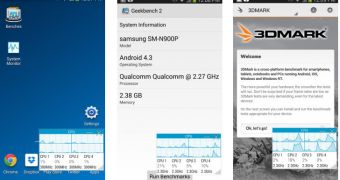The first time the community noticed Samsung was boosting its smartphones’ capabilities, to perform much better during benchmarking, it was last year in October.
The folks over at AnandTech published a table where each benchmark score obtained by various smartphones were recorded, and Samsung’s Galaxy S4 and Galaxy Note 3 were among the devices cheating these benchmarks.
Samsung was not the only company that used hidden trick to boost its smartphones’ capabilities during benchmarks. HTC and LG introduced similar features into some of their products, but they weren’t active during all benchmarking applications.
For example, HTC One and HTC One mini’s benchmark boosting capabilities only activated in 3DMark, AnTuTu Benchmark, GFXBench 2.7 and Vellamo, while LG G2 only cheated AnTuTu and Vellamo scores.
Well, Samsung Galaxy S4’s software has been modified to boost scores when the following benchmarking applications were active: AnTuTu, AndEBench and Vellamo.
Samsung performed the process of virtually boosting benchmarking scores since Galaxy S4 was launched and the Galaxy Note 3 was able to cheat most of the applications reviewers used to test it, including 3DMark, AnTuTu, AndEBench, BasemarkX, Geekbench 3, GFXBench 2.7 and Vellamo.
But how would Samsung be able to trick these benchmarking applications into recording much higher scores for its Galaxy S4 and Galaxy Note 3 devices? Well, it’s pretty simple.
The moment the smartphone detects one of the benchmarking applications would be run, it would increase the speed of all of its four cores to the maximum and would stay there until the application is closed.
This translated into slightly higher benchmarking results for Samsung Galaxy S4 and Galaxy Note 3 when they were tested with one of the applications mentioned earlier.
The tests were made with different versions of Android and all Samsung devices were cheating these benchmarking applications until KitKat was released.
According to ArsTechnica, once Android 4.4.2 KitKat update is applied to Samsung Galaxy S4 and Galaxy Note 3, these devices would now act normal while tested with the benchmarking applications listed above.
It looks like Samsung has decided to remove any hidden benchmark boosting tricks these two Android smartphones were integrated with.
Hopefully, they will not be present in the Galaxy S5 either now that Samsung knows that we can detect any hidden tweaks that might tamper with benchmarking results.
This will finally allow reviewers to test Samsung’s devices without fear of getting virtual inflated benchmarking results while using the most common performance testing tools.
And with accurate results come fair opinions for those users obsessed by specs and performance who use benchmark results to decide on which device to spend their money.

 14 DAY TRIAL //
14 DAY TRIAL //